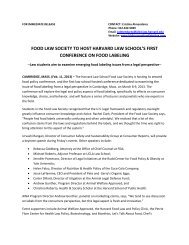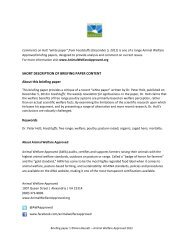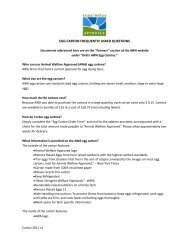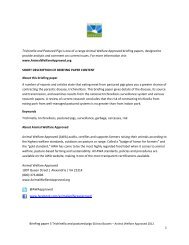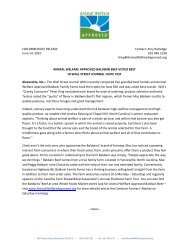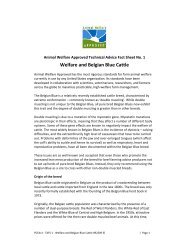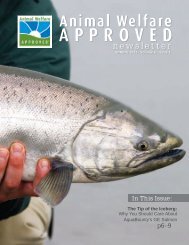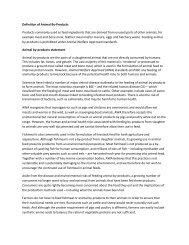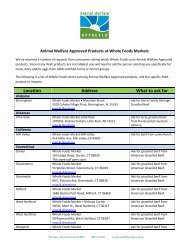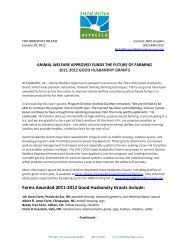You also want an ePaper? Increase the reach of your titles
YUMPU automatically turns print PDFs into web optimized ePapers that Google loves.
The<br />
<strong>Animal</strong><br />
<strong>Welfare</strong><br />
Institute<br />
introduces<br />
a visionary<br />
way to<br />
fight<br />
animal<br />
factories<br />
<strong>food</strong> labels are packed with<br />
information, but some words can<br />
be confusing, if not downright<br />
misleading. A dozen eggs in a<br />
carton boasting the statement “farm<br />
fresh,” for example, have probably<br />
not come from anything that looks<br />
remotely like a farm. A dairy cow is far<br />
from “happy” at an industrial facility<br />
where she never grazes on pasture.<br />
And “natural” is not synonymous with<br />
“humane”—in fact, the former term<br />
refers only to meat processing, not the<br />
animals’ lives. To a growing number of<br />
Americans, such marketing strategies<br />
cause concern about what these products<br />
purport to be, as well as what they try<br />
to conceal.<br />
Now there is a label with nothing<br />
to hide. We are proud to present our<br />
<strong>Animal</strong> <strong>Welfare</strong> <strong>Approved</strong> standards,<br />
the most humane and progressive care<br />
requirements in the nation. Today,<br />
hundreds of participating family farms<br />
are putting each individual animal’s<br />
comfort and well-being first. The<br />
program benefits all of us with the<br />
simple understanding that our own<br />
best interests are intrinsically linked to<br />
animals and the environment.<br />
These standards seek to ensure that<br />
cattle graze on green pastures, sows<br />
and hens can build nests before giving<br />
birth, and ducks are always able to<br />
swim in clean water. But the <strong>Animal</strong><br />
<strong>Welfare</strong> <strong>Approved</strong> seal is not just a list of<br />
rules. It is a philosophy of respect that<br />
provides animals on the farm with the<br />
environment, housing and diet they need<br />
to behave naturally, thereby promoting<br />
physiological and psychological health<br />
and well-being. This is the story behind<br />
the label—the animals, the people and<br />
the principles that guided us every step<br />
of the way.<br />
“We demand the ultimate<br />
sacrifice of animals raised<br />
for <strong>food</strong>. Humans owe them<br />
a humane and dignified<br />
existence in return. The<br />
<strong>Animal</strong> <strong>Welfare</strong> Institute is<br />
setting the gold standard for<br />
how farm animals should<br />
be taken care of. I’ve worked<br />
closely with the organization<br />
for years and have seen its<br />
independence and deep<br />
commitment to humane<br />
animal farming.”<br />
—Robert F. Kennedy, Jr.<br />
ne animal, one farmer, one field, one family at a time.
No double standards<br />
“The <strong>Animal</strong><br />
<strong>Welfare</strong><br />
<strong>Approved</strong><br />
seal will help<br />
consumers<br />
select<br />
products from<br />
traditional<br />
farms that<br />
allow all their<br />
animals to<br />
move and<br />
socialize<br />
freely, breathe<br />
fresh air<br />
and grow<br />
naturally.”<br />
—Bill Niman,<br />
founder of<br />
Niman Ranch<br />
Farming with Integrity<br />
<strong>Animal</strong> <strong>Welfare</strong> <strong>Approved</strong> is the first seal to<br />
guarantee that humanely labeled products do not<br />
come from agribusiness-owned operations that<br />
raise some of their animals under cruel conditions.<br />
In a practice we disallow called “double standard<br />
certification,” these companies adhere to certain<br />
standards to label some of their products “humane,”<br />
while managing other animals of the same species<br />
using industrial practices. Such operations typically<br />
enjoy financial advantages that enable them to<br />
displace independent family farmers who practice<br />
a humane ethic throughout their farms. We want<br />
consumers to rest assured that when they buy<br />
products carrying the <strong>Animal</strong> <strong>Welfare</strong> <strong>Approved</strong><br />
label, the farmers have applied our standards to all<br />
members of an <strong>Animal</strong> <strong>Welfare</strong> <strong>Approved</strong> species.<br />
Only family farms can earn our seal. Families<br />
that own the animals, labor on, and earn meaningful<br />
livelihoods from their farms have a true commitment<br />
and connection to their animals that is lost on<br />
animal factories managed by distant, corporate<br />
happy tails<br />
“AWI has almost two decades of experience<br />
in developing and implementing standards<br />
for animals on farms. In 1989, I was<br />
privileged to collaborate with ethologists,<br />
veterinarians and farmers to create the<br />
first set of pig welfare standards in the<br />
United States for AWI; this work served as<br />
the basis for the current <strong>Animal</strong> <strong>Welfare</strong><br />
<strong>Approved</strong> requirements.”<br />
owners and run by hired hands. Revitalizing a culture of<br />
humane family farming will help ensure that husbandry<br />
knowledge, experience and skills can be passed on from<br />
one farmer to another and from one generation to the<br />
next, through conversation, observation and first-hand<br />
experience. In the words of Patrick Martins, co-founder<br />
of Heritage Foods USA, “Small family farms need as<br />
much attention as possible, and an organization like<br />
AWI will help our farmers greatly.”<br />
—Diane Halverson,<br />
AWI farm animal advisor<br />
Common practices that other labeling programs allow, such as cutting<br />
off live pigs’ tails and a portion of live chickens’ beaks, are prohibited<br />
under the <strong>Animal</strong> <strong>Welfare</strong> <strong>Approved</strong> standards. Our standards not<br />
only forbid these mutilations, but also address the root causes of the<br />
practices by requiring an enriched environment in which the animals<br />
can socialize naturally and have no fear or stress-induced inclination to<br />
harm each other. In addition, cloned animals are not allowed.<br />
“At the heart of our standards is concern<br />
and advocacy for the animals.”<br />
—Cathy Liss,<br />
AWI president<br />
photos: cover cows (Diane Halverson/AWI); rooster in barn (Jason Houston); sheep (Laurie Smith);<br />
pig tail (Marlene Halverson/AWI); Martin Kramer of Niman Ranch with piglet (Laurie Smith)<br />
Now consumers can be sure their purchases only support farms<br />
that raise all of their animals according to label claims.<br />
f<br />
pain, injury and disease<br />
“<strong>Animal</strong> <strong>Welfare</strong> <strong>Approved</strong> is a system that benefits<br />
the environmentalist, the biologist, the animal<br />
welfarist, the farmer and the chef. We all see<br />
eye-to-eye for different reasons.”<br />
—Dan Barber, creative director, Stone Barns Center for Food and<br />
Agriculture, Pocantico Hills, N.Y.; chef and co-owner,<br />
Blue Hill restaurants, NYC and Stone Barns Center<br />
Breaking the Trend<br />
According to the Food and Agriculture Organization of the United<br />
Nations, the 20 th century saw the disappearance of one third of the<br />
world’s breeds of animals raised for <strong>food</strong>. That is because animals<br />
raised on factory operations are selected for uniformity, not diversity.<br />
The industry-bred turkey, for instance, suffers from skeletal<br />
deformities that may cause gait problems. Due to their oversized<br />
breasts, the birds are not able to reproduce naturally, so hens are<br />
artificially inseminated. We believe that breeding programs must<br />
select not only for certain “production” traits such as growth rate, but<br />
for characteristics such as good mothering abilities, sound skeletal<br />
structure and fitness, including the ability to mate naturally. Genetic<br />
variety is key.<br />
On the <strong>Animal</strong> <strong>Welfare</strong> <strong>Approved</strong> Good Shepherd Turkey<br />
Ranches in Kansas, heritage turkey flocks forage on range,<br />
the five reedoms<br />
freedom from fear and distress freedom from<br />
mate naturally and fly easily to roosts. In Wisconsin,<br />
Tony and Sue Renger’s Berkshire pigs roam grassy<br />
slopes, and the Cates Family Farm beef cattle graze on<br />
green pastures. Throughout the Midwest, the family<br />
farmers who market pigs with Niman Ranch provide<br />
straw-bedded barns, pastures or woodlands. In North<br />
Carolina, Mike and Suzanne Jones’ Farmers’ Hybrid<br />
pigs root in the woodlands, Eliza MacLean’s Ossabaw<br />
hogs cool off in the shade of pine trees, and pigs on<br />
small farms that market through William’s Pork enjoy<br />
rich mud wallows. These are just some of the farms<br />
that have earned our seal.<br />
Gathering and evaluating the <strong>Animal</strong> <strong>Welfare</strong><br />
<strong>Approved</strong> standards was the result of years of work and<br />
dedication by <strong>Animal</strong> <strong>Welfare</strong> Institute staff, in collaboration<br />
with veterinarians, scientists and farmers. Our<br />
standards are constantly reexamined, so they remain<br />
up-to-date and true to their purpose of providing the<br />
ultimate humane care for animals on farms. But most<br />
of all, the <strong>Animal</strong> <strong>Welfare</strong> <strong>Approved</strong> label strengthens<br />
the power that comes from freedom of choice in the<br />
marketplace. In the fight against animal factories, every<br />
purchase counts. Visit www.<strong>Animal</strong><strong>Welfare</strong><strong>Approved</strong>.<br />
org for more information.<br />
(including parasitical infections)<br />
freedom from hunger, thirst and malnutrition,<br />
freedom to express normal behavior freedom from<br />
physical and thermal discomfort<br />
The <strong>Animal</strong> <strong>Welfare</strong> <strong>Approved</strong> Standards require<br />
farmers to provide animals the Five Freedoms<br />
identified by the United Kingdom’s<br />
Farm <strong>Animal</strong> <strong>Welfare</strong> Council.<br />
t’s about raising animals in a humane way with care and respect.
The <strong>Animal</strong> <strong>Welfare</strong> <strong>Approved</strong> program and<br />
<strong>food</strong> label promote the well-being of animals<br />
and the sustainability of high welfare,<br />
independent family farms.<br />
A program of the <strong>Animal</strong> <strong>Welfare</strong> Institute<br />
P.O. Box 3650, Washington, DC 20027; (703) 836-4300; fax (703) 836-0400<br />
email: awa@awionline.org; www.animalwelfareapproved.org<br />
Reprinted from the AWI Quarterly, Winter 2007, Volume 56 Number 1; Above photo: Frank Reese, Good Shepherd Turkey Ranch (Laurie Smith)<br />
6 AWI Quarterly




